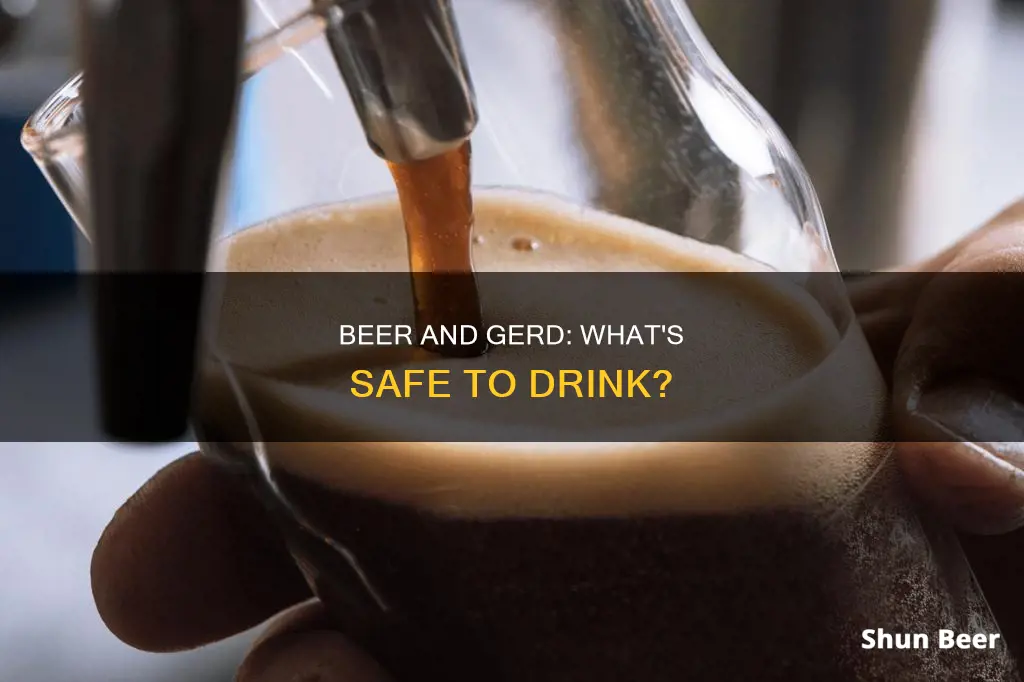
Gastroesophageal reflux disease (GERD) is a chronic medical condition caused by the lower part of the oesophagus not functioning properly. This results in acid and other stomach contents flowing back up and irritating the oesophagus, causing a burning sensation in the chest (heartburn). While the stomach can withstand acid, the oesophagus and other body tissues cannot. Beer is a known risk factor for heartburn because it is alcoholic, acidic, and carbonated. Some beers also contain ingredients such as chocolate, coffee, chilli peppers, or mint, which have been linked to heartburn. However, the relationship between alcohol and GERD is complex, and there is no clear consensus on the best alcoholic beverage for those with GERD.
| Characteristics | Values |
|---|---|
| Alcohol consumption and GERD | Research has found a link between alcohol consumption and GERD. Higher intake and frequency of alcohol consumption are more strongly linked with GERD. |
| Alcohol and acid reflux | Alcohol can affect acid reflux by relaxing the muscle at the end of the oesophagus, making it easier for stomach acid to back up. |
| Alcoholic drinks and acid reflux | Beer and wine have been found to trigger reflux compared to drinking water. |
| Best alcoholic drinks for GERD patients | Gin, tequila, and non-grain vodkas are low-acidity options. |
| Worst alcoholic drinks for GERD patients | Drinks with high natural acidity, such as those made with citrus juice, peppermint, chocolate, or coffee. |
What You'll Learn

Beer and acid reflux
Beer is a well-known culprit of heartburn, a symptom of acid reflux, or gastroesophageal reflux disease (GERD) when frequent. Beer is alcoholic, acidic, and carbonated, all of which contribute to heartburn risk. Beer also often contains added ingredients such as chocolate, coffee, chilli peppers, or mint, which are linked to heartburn.
The lower esophageal sphincter (LES) is a tight ring of muscle that connects the oesophagus to the stomach, keeping stomach contents from backing up into the oesophagus. When this muscle relaxes, acidic stomach contents can flow up the oesophagus, causing a painful burning sensation known as heartburn. Beer can cause the LES to relax in several ways.
Firstly, alcohol in general relaxes the muscle at the end of the oesophagus. Beer is also often consumed in large quantities, and simply having a large amount of liquid in the stomach can relax the LES. Beer is also carbonated, and the bubbles of carbon dioxide or added nitrogen can compound the feeling of fullness.
Beer and GERD
Frequent heartburn may indicate GERD, a more serious condition. According to a 2019 review, drinking three or more alcoholic beverages a week may be associated with GERD. A 2018 review also found an association between the frequency and volume of alcohol consumption and GERD. As such, people prone to acid reflux or with GERD are often advised to limit or avoid drinking alcohol altogether.
Low-Risk Alcoholic Drinks for Acid Reflux
While there is no consensus on which alcoholic drinks are least likely to cause acid reflux, some research suggests that spirits with a high ethanol content, like gin, whiskey, and cognac, may be better. High-proof spirits are less likely to stimulate stomach acid secretion than drinks with lower ethanol content. Spirits with a lower pH level, such as tequila and non-grain vodka, are also good options. These spirits are best mixed with low-acid juices like apple or pear, or with water.
Golfing and Beer Drinking at Hillandale: Is It Allowed?
You may want to see also

Alcohol and GERD
Gastroesophageal reflux disease (GERD) is a chronic medical condition caused by the inability of the lower part of the oesophagus to function properly. This results in the acid and contents from the stomach backing up, irritating the oesophagus and causing a burning sensation in the chest (heartburn) and irritation of the oesophagus.
Alcohol consumption may increase the risk of developing GERD and can worsen symptoms for those who already have the condition. According to a 2019 review, drinking alcohol is linked to a higher risk of GERD, with higher intake and drinking frequency increasing the likelihood of developing the condition. However, a 2022 review found that drinking three or fewer alcoholic drinks a week may be associated with GERD.
Alcohol's Effect on the Body
Alcohol can affect the stomach and oesophagus in several ways, leading to acid reflux and irritation of GERD symptoms. These include:
- Irritating the throat or stomach due to the chemicals it contains.
- Relaxing the muscle leading to the stomach, making it easier for stomach contents to leak out.
- Increasing acid production in the stomach and making the tissues more sensitive to acid.
- Affecting food choices, as alcohol can impair judgement and lead to the consumption of trigger foods.
- Increasing the risk of acid reflux when consumed with sugary or carbonated drinks.
- Increasing the risk of cancer of the oesophagus when combined with smoking.
Reducing GERD Symptoms
To reduce the risk of GERD symptoms when drinking, it is recommended to:
- Limit alcohol consumption to one drink, which is equivalent to a 12-ounce beer, 8-9 ounces of malt liquor, a 5-ounce glass of wine, or 1.5 ounces of distilled liquor.
- Avoid drinking alcohol 2-3 hours before bed, as lying down with alcohol in the stomach can increase the risk of acid reflux.
- Keep a food and drink journal to identify any patterns between certain beverages and GERD symptoms.
- Avoid mixing alcohol with drinks that are known to aggravate acid reflux, such as orange juice or carbonated beverages. Instead, mix with low-acid fruit juice or water.
- Avoid smoking while drinking, as tobacco use is linked to acid reflux and the development of GERD.
Alcohol Types and GERD
Research has been conducted to determine if specific types of alcohol are more likely to aggravate GERD symptoms. While the results have been inconclusive, some studies suggest that spirits with a high ethanol content, such as gin, whiskey, and cognac, may be better options for those with acid reflux. High-proof spirits are less likely to stimulate stomach acid secretion than drinks with lower ethanol content. Additionally, spirits with a lower pH level, such as tequila and non-grain vodka, may also be better choices.
In summary, alcohol consumption is a significant risk factor for developing GERD and can worsen symptoms for those with the condition. It is recommended that individuals prone to acid reflux or living with GERD limit or avoid alcohol consumption altogether.
Can Christians Drink Beer? Exploring Religious Boundaries
You may want to see also

Worst drinks for acid reflux
Drinking alcohol can increase the risk of developing GERD, and it is known to be a common trigger for acid reflux. Research has shown that higher intake and frequency of alcohol consumption are more strongly linked with GERD.
Alcohol can irritate the tissues in the oesophagus, relax the muscle leading to the stomach, and affect the production of stomach acid. It can also affect food choices, with people more likely to eat foods that cause acid reflux after drinking alcohol.
As such, healthcare professionals recommend that people who are prone to acid reflux or GERD limit or avoid drinking alcohol altogether.
- Alcoholic beverages
- Sugary, citrus, or carbonated alcoholic drinks
- Coffee, both caffeinated and decaf
- Citrus fruit juices, such as orange or grapefruit juice
- Carbonated drinks
- Caffeinated drinks, such as tea
Drinking 20 Beers: A Night to Remember or Forget?
You may want to see also

Best drinks for GERD patients
If you have gastroesophageal reflux disease (GERD), it's important to know that drinking alcohol can increase your risk of developing symptoms such as acid reflux and heartburn. According to a 2019 review, higher alcohol intake and frequency were linked to a greater likelihood of GERD. Therefore, it is recommended that people prone to acid reflux or GERD limit or avoid drinking alcohol altogether.
However, if you are a GERD patient who still wants to enjoy an occasional drink, here are some tips and suggestions for the best drinks to minimise your symptoms:
- Choose drinks with low acidity: Alcoholic drinks vary in their acidity levels, and high acidity can trigger reflux symptoms. According to their pH level, gin, tequila, and non-grain vodkas are the lowest acidity options.
- Mix with light juices: When mixing drinks, opt for light juices like apple, pear, or cranberry juice. These juices have a milder flavour that won't trigger reflux as strongly as highly acidic or citrus juices.
- Drink water: If you don't want to compromise on the flavour of your beverage, make sure to have plenty of water alongside your drink. Water can help neutralise the load on your stomach and reduce the risk of reflux.
- Limit your intake: Stick to one drink per night and avoid drinking two to three hours before bedtime. This will reduce the likelihood of experiencing heartburn and regurgitation during the night.
- Avoid high-risk drinks: Stay away from drinks made with a lot of citrus juice, such as margaritas and daiquiris, as well as drinks containing peppermint, chocolate, or coffee, as these are common reflux triggers.
- Avoid greasy food: While not a drink, it's worth noting that greasy pub food or high-fat foods can worsen your symptoms, so it's best to avoid them when drinking.
While there is no one-size-fits-all solution for GERD patients, following these guidelines can help you make more informed choices about your alcohol consumption and potentially reduce the severity and frequency of your symptoms.
George Washington's Beer: A Founding Father's Beverage of Choice
You may want to see also

Alcohol-free alternatives
If you're experiencing GERD, it's best to limit or avoid drinking alcohol altogether. Alcohol can irritate the throat or stomach, affect the stomach's acid production, and relax the muscle leading to the stomach, making it more likely for stomach acid to back up into the oesophagus.
However, if you're looking for alcohol-free alternatives, there are a few options to consider:
- Non-alcoholic beer, wine, and spirits: These drinks allow you to enjoy the taste of alcohol without the reflux-inducing effects. The Zero Proof is a brand that offers a wide range of non-alcoholic options, including wines, spirits, and mocktail recipes.
- Herbal teas: Herbal teas are known to be beneficial for people with acid reflux.
- Coconut water: Coconut water is a healthy and refreshing alternative to alcoholic beverages.
- Smoothies: Smoothies made with reflux-friendly ingredients can be a delicious and nutritious option.
- Plant-based milk: Plant-based milk, such as almond, oat, or soy milk, can be a good alternative to dairy, which may trigger reflux symptoms in some people.
When choosing alcohol-free alternatives, it's important to avoid common trigger ingredients such as citrus fruit juices, mint, spices, peppers, chocolate, and coffee. It's also a good idea to work with a registered dietitian to identify your personal reflux triggers and choose the best drink options for you.
Beer-Cooked Brats: Can I Drink the Leftover Brew?
You may want to see also
Frequently asked questions
It's best to avoid drinking beer if you have GERD, as alcohol is a common trigger of acid reflux. However, if you want to drink beer, it's recommended to stick to one drink and to stop drinking at least three hours before bedtime.
According to the pH level, gin, tequila, and non-grain vodkas are the lowest acidity options.
It is recommended to drink low-acid fruit juices such as apple or carrot juice, or mix a drink with water.
It is recommended to avoid drinks with high natural acidity, such as margaritas and daiquiris. Drinks made with peppermint, chocolate, or coffee (e.g. Irish coffee) are also reflux triggers.
Greasy, high-fat foods can worsen GERD symptoms. It is also recommended to avoid spicy or greasy foods, tomatoes and tomato products, and food and drinks containing caffeine.







